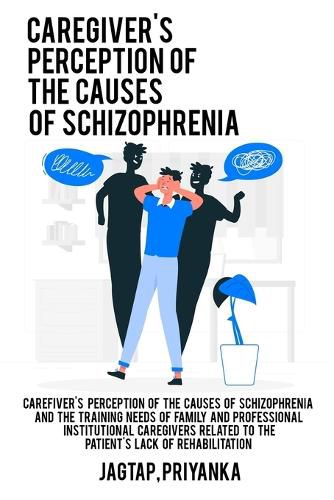Readings Newsletter
Become a Readings Member to make your shopping experience even easier.
Sign in or sign up for free!
You’re not far away from qualifying for FREE standard shipping within Australia
You’ve qualified for FREE standard shipping within Australia
The cart is loading…






This title is printed to order. This book may have been self-published. If so, we cannot guarantee the quality of the content. In the main most books will have gone through the editing process however some may not. We therefore suggest that you be aware of this before ordering this book. If in doubt check either the author or publisher’s details as we are unable to accept any returns unless they are faulty. Please contact us if you have any questions.
ABSTRACT Schizophrenia is a major psychiatric disorder that affects an individual's perception, thoughts, affect and behavior. Pharmacotherapy and psychosocial interventions both are crucial for better management of the course of the disorder and for a better prognosis. Caregivers of people with schizophrenia play an important role in the long-term and effective treatment program. Their understanding about the disorder and its causes is important for assuring success of psychosocial intervention since they have to maintain treatment programs started off for the patient. Additionally, rehabilitation revolves around the various cognitive and social deficits seen in the people with schizophrenia. Both professional/institutional as well as family caregivers need to develop a good understanding of these deficits and means to remediate them, in order for a rehabilitation package to be successful. The aim of this study was to understand the perception of the family and the professional/institutional caregivers about the causation of schizophrenia, various areas of patient-related deficits and the rehabilitation training needs. It was hypothesized that the professional caregivers will have a better understanding of the causes, deficits and rehabilitation needs of the people with schizophrenia as compared to the family caregivers. Often it is assumed that professional caregivers would have a better grasp of the illness, and family member caregivers may be misinformed. It is also often assumed that the latter would therefore have a need for information. This study also attempts to explore the possibility of a good understanding about persons with schizophrenia among family members who care for them, and an acceptance of healthy ways to help them.
$9.00 standard shipping within Australia
FREE standard shipping within Australia for orders over $100.00
Express & International shipping calculated at checkout
This title is printed to order. This book may have been self-published. If so, we cannot guarantee the quality of the content. In the main most books will have gone through the editing process however some may not. We therefore suggest that you be aware of this before ordering this book. If in doubt check either the author or publisher’s details as we are unable to accept any returns unless they are faulty. Please contact us if you have any questions.
ABSTRACT Schizophrenia is a major psychiatric disorder that affects an individual's perception, thoughts, affect and behavior. Pharmacotherapy and psychosocial interventions both are crucial for better management of the course of the disorder and for a better prognosis. Caregivers of people with schizophrenia play an important role in the long-term and effective treatment program. Their understanding about the disorder and its causes is important for assuring success of psychosocial intervention since they have to maintain treatment programs started off for the patient. Additionally, rehabilitation revolves around the various cognitive and social deficits seen in the people with schizophrenia. Both professional/institutional as well as family caregivers need to develop a good understanding of these deficits and means to remediate them, in order for a rehabilitation package to be successful. The aim of this study was to understand the perception of the family and the professional/institutional caregivers about the causation of schizophrenia, various areas of patient-related deficits and the rehabilitation training needs. It was hypothesized that the professional caregivers will have a better understanding of the causes, deficits and rehabilitation needs of the people with schizophrenia as compared to the family caregivers. Often it is assumed that professional caregivers would have a better grasp of the illness, and family member caregivers may be misinformed. It is also often assumed that the latter would therefore have a need for information. This study also attempts to explore the possibility of a good understanding about persons with schizophrenia among family members who care for them, and an acceptance of healthy ways to help them.